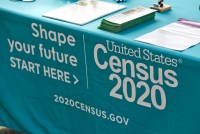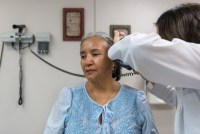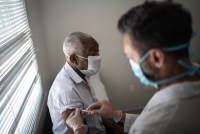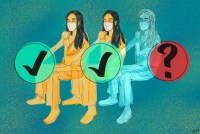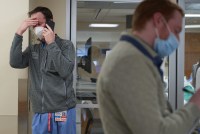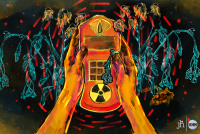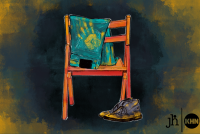Latest Morning Briefing Stories
States Have Yet to Spend Hundreds of Millions of Federal Dollars to Tackle Covid Health Disparities
A year ago, the Centers for Disease Control and Prevention awarded states and local health departments $2.25 billion to help people of color and other populations at higher risk from covid. But a KHN review shows public health agencies across the country have been slow to spend it.
Census Undercount Threatens Federal Food and Health Programs on Reservations
The 2020 census undercounted people living on Native American reservations. The money for many needed federal aid programs is tied to those population numbers.
KHN’s ‘What the Health?’: Leaked Abortion Opinion Rocks Washington’s World
The unprecedented early leak of a Supreme Court draft opinion that would overturn the landmark abortion-rights ruling Roe v. Wade has heated the national abortion debate to boiling. Meanwhile, the FDA, after years of consideration, moves to ban menthol flavors in cigarettes and cigars. Joanne Kenen of the Johns Hopkins Bloomberg School of Public Health and Politico, Shefali Luthra of the 19th, and Jessie Hellmann of CQ Roll Call join KHN’s Julie Rovner to discuss these issues and more. Plus, Rovner interviews KHN’s Paula Andalo, who wrote the latest KHN-NPR “Bill of the Month” episode about a family whose medical debt drove them to seek care south of the border.
California abre el Medi-Cal a adultos mayores indocumentados
El estado vuelve a ser pionero en su esfuerzo porque todos tengan seguro de salud, más allá de su estatus migratorio.
California Opens Medicaid to Older Unauthorized Immigrants
Starting May 1, low-income unauthorized immigrants over age 49 became eligible for full Medicaid health coverage, a significant milestone in California’s effort to expand coverage.
Por qué adultos mayores de minorías no reciben la vacuna de alta dosis contra la gripe
Esta vacuna reforzada contra la influenza, podría ser más efectiva contra el virus, pero es más costosa. Y no suele estar disponible para las poblaciones más vulnerables.
Why Black and Hispanic Seniors Are Left With a Less Powerful Flu Vaccine
Federal health officials haven’t taken a clear position on whether a high-dose influenza vaccine — on the market since 2010 — is the best choice for people 65 and older. Many in that group already opt for the costlier enhanced shot. Those who get the standard vaccine are disproportionately members of ethnic and racial minorities.
Black Students Experiencing Racism on Campus Lack Mental Health Support
Black students at many predominantly white colleges are speaking out about the racial hostility they’ve experienced, which contributes to depression, elevated stress levels, and anxiety. But the students are often not getting the mental health help they need on campus.
‘The Danger Is Still There’ ― As Omicron Lurks, Native Americans Are Wary of Boosters
Federal data shows that vaccination rates for American Indians and Alaska Natives were some of the highest in the nation, but tribes say resistance has slowed efforts to boost members.
Black Therapists Fight to Be Seen on TikTok. When They Are, They Find Solidarity.
Black mental health therapists talk openly on TikTok about working in a predominantly white field, while at the same time making mental health care more accessible for people of color who might be shut out of the health care system.
Charts Paint a Grim Picture 2 Years Into the Coronavirus Pandemic
The on-off nature of the pandemic “has led to a lot of the confusion and grumpiness,” says one expert. Another compares it to the exhaustion of the American public when hearing body counts during the Vietnam War.
Calls to Overhaul Methadone Distribution Intensify, but Clinics Resist
The pandemic has shown that loosening the strict regulations on distributing methadone helps people recovering from addiction stay in treatment. But clinics with a financial stake in keeping the status quo don’t want to make permanent changes.
This episode is the second half of a two-part series about uranium mining on the Navajo Nation. A coalition of Indigenous leaders and non-Native locals are lobbying Congress and fielding research to force the cleanup of abandoned uranium mining sites and expand federal compensation for workers harmed by the uranium industry.
Health Care Firms Were Pushed to Confront Racism. Now Some Are Investing in Black Startups.
A new investment fund launched by one of the few Black venture capitalists in health care is focused on backing Black entrepreneurs. And the investors include some of the biggest names in for-profit health care.
What Does It Say About Your Neighborhood If the Supermarket Isn’t So Super?
A mother-and-daughter team went comparison-shopping to see what grocery store shelves revealed about inequity in America.
‘American Diagnosis’ Episode 3: Uranium Mining Left Navajo Land and People in Need of Healing
Episode 3 is an exploration of the forces that brought uranium mining to the Navajo Nation, the harmful consequences, and the fight for compensation that continues today.
Proteger a su comunidad, el impulso que mejora la vacunación y las pruebas para covid entre hispanos
¿Qué es el sentido de pertenencia que impulsa a proteger con acciones individuales a una comunidad? Los latinos parecen actuar de esa manera frente a covid.
Covid Precautions Are Part of Hispanic Community’s Efforts to Tend to Community Good
Among many Latinos, especially recent immigrants, there is a cultural emphasis on living in harmony within one’s community — called “convivir” in Spanish. That notion may have helped drive improvements in covid vaccination and testing rates.
Otra amenaza a la educación en la era de covid: jubilación masiva de maestros latinos
En 2021, el 59% de los educadores hispanos estaba planeando retirarse, algunos antes de tiempo. Una cifra mucho más alta que años anteriores.
Exits by Black and Hispanic Teachers Pose a New Threat to Covid-Era Education
Schools that serve poor and disadvantaged kids have taken a series of hits during the pandemic. Now, teachers of color are leaving the profession at higher rates than are white teachers.




